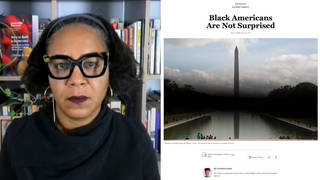
Guests
- Andy Levinformer Democratic congressmember from Michigan.
- James Zogbypresident of the Arab American Institute.
President Joe Biden won the Michigan Democratic primary on Tuesday, but over 100,000 voters cast their ballots for “uncommitted” in an organized campaign protesting U.S. support for Israel’s assault on Gaza. The major battleground state is home to one of the largest Arab American populations in the country, but the movement to vote “uncommitted” is now expected to spread to other states, including Minnesota and Washington. “I’ve rarely seen such an organic and authentic movement come together,” says former Democratic congressmember from Michigan Andy Levin. “We really need actual change in policy, and I think we sent that message strongly last night.” President of the Arab American Institute James Zogby says that Democratic voters need a reason to come out to the polls. “We gave them a reason with 'uncommitted.' Joe Biden’s got to give them a reason in November,” says Zogby. “There is genocide unfolding. People want it to end. The president either is going to have to act decisively to end it, or it’s going to have an impact in November.”
Transcript
AMY GOODMAN: We begin today’s show in Michigan, where President Joe Biden won the Democratic primary Tuesday but faced a significant backlash over his support for Israel’s assault on Gaza. Biden won about 81% of the vote, but over 100,000 voters, or more than 13%, cast their ballots for “uncommitted.”
In recent weeks, the group Listen to Michigan urged Democrats to vote “uncommitted” to pressure Biden to call on Israel to end its assault on Gaza. Organizers of the campaign had said they were hoping for 10,000 “uncommitted” votes, pointing to Donald Trump’s win of less than 11,000 votes in 2016, to show the significance of that number. Tuesday’s vote shows they got 10 times that amount.
Michigan is the first major battleground state in the general election to hold its primary. It’s also home to one of the largest Arab American populations in the country. Top White House officials visited Michigan earlier this month to meet with Arab and Muslim leaders after a number of them refused to meet with Biden’s campaign manager.
The movement to vote “uncommitted” will likely spread to other states. Organizers of the movement are holding a call with supporters in Minnesota, which will vote next week, and Washington state, which holds its primary March 12th.
For more, we’re joined by two guests. James Zogby is president of the Arab American Institute. His new opinion piece for Pakistan Today is titled “Why the USA Continues to Fail the Arab World.” He’s joining us from Utica, New York. We’re also joined by former Democratic Congressmember from Michigan Andy Levin. He’s joining us from Southfield, Michigan.
We welcome you both to Democracy Now! You’re a former congressmember, Andy Levin. You’re also a former synagogue president. Talk about this “uncommitted” campaign. For every six votes President Biden got yesterday in the primary, “uncommitted” got one. Talk about the organizing effort and what message that you hope that those who supported “uncommitted,” like yourself, sent to President Biden.
ANDY LEVIN: Well, good morning, Amy and everyone. I don’t have much of a voice left, so sorry about that.
It was really an incredible thing, Amy. You know, I’ve been organizing for peace for 40 years, and I’ve rarely seen such an organic and authentic movement come together in, as you say, just three weeks. And we got over 100,000 people to vote “uncommitted.” This was something that grew up out of the Arab American and larger Muslim communities in Michigan, but it had great power among progressives, among Jewish people, Christians, Muslims, people of other faiths, people of no faith. College campuses were aflame about this.
And the idea was that Michigan has this “uncommitted” box on our ballot, because, remember, this is a presidential primary, and some other states do the same thing. You’re voting to send delegates to a convention, so you could vote to send delegates “uncommitted.” And, in fact, we won so many votes, I believe we will send at least one delegate from two congressional districts: the 6th District, represented by Debbie Dingell, and the 12th District, represented by Rashida Tlaib.
I think the significance of this, Amy, is that the president’s people, and maybe the president himself, there’s a danger that they see this as sort of like a political problem: “We need to send surrogates. We need better messaging. People just need to realize what a disaster Trump would be, which, of course, we can never let him get near the White House again. So they’ll come around all of this.” No. This is war. This is the killing of tens of thousands of innocent people, leveling whole neighborhoods, most of the Gaza Strip. We don’t just want you to use a better message.
The message from us to the president yesterday was: You must change course. You must change course for the sake of your political reelection and because it’s the right and necessary thing to do from every point of view, including U.S. national security interests, for God’s sake. The message to the president is: Stop treating what Bibi Netanyahu says as the boundary of the possible. You’ve got to move towards an immediate and permanent ceasefire and an end to this carnage, free all the hostages, free political prisoners among the Palestinians, including leading longtime prisoners who — if you don’t like Hamas, free Marwan Barghouti, who’s been in prison for so long, whom many Palestinians might support to change the situation there. So, we really need actual change in policy, and I think we sent that message strongly last night.
JUAN GONZÁLEZ: Andy Levin, I wanted to ask you — I was particularly struck by the turnout. The Michigan Secretary of State Jocelyn Benson said this was a record turnout on Tuesday for a presidential primary. Compared to, for instance, South Carolina, where only 4% of Democrats voted in the primary, here we had over, it looks like, 50%? Could you explain this issue of turnout, as well?
ANDY LEVIN: Well, one thing is that there were more — quite a greater number of Republicans voting, or people voting in the Republican primary than the Democratic primary. That’s also something that’s not great for President Biden. But there was some sense of a contest on that side, right? Even though we all know that Nikki Haley was going to trail by a wide margin.
But it is remarkable, Juan. Think about it. We have an incumbent Democratic president running for reelection. We all know he’s going to be the nominee. Most Democrats feel like maybe he’s done a really great job in other areas. Personally, I was really proud to serve with him in the 117th Congress. I’m proud of the Investing in America agenda that we passed, having some, at least a semblance of, industrial policy in America for the first time in many decades, and on and on. But what’s remarkable is that this 100,000-plus people who voted “uncommitted,” almost all of them, Juan, wouldn’t have showed up but for this. They’re mad at the president. They would have stayed home.
And our message was: Wait a minute. That would be a disaster if you stayed home. He won’t get the message. He won’t understand. Come out and express your rage. Shake your fist at the president and say, “Look,” for most of them, “I voted for you in 2020. I’m really mad at you right now, and I have to tell you.” So, that, I think, juiced turnout.
And look at East Lansing, where Michigan State University is. Look at Ann Arbor, where the University of Michigan is. It’s not just Dearborn and Hamtramck, with our incredible, beautiful concentration of Arab American and other Muslim voters. It’s also young people across the state and progressives across the state who said, “We’re your base. We want to win in November. In order to win, we want peace now.”
AMY GOODMAN: Andy Levin, the last time we talked to you, you were a congressmember. You were running for reelection. AIPAC, the American Israel Public Affairs Committee, had invested millions in Democratic primaries to defeat progressives who supported Palestine. You were one of those they were trying to defeat. You’re a self-described Zionist who supports a two-state solution. But earlier, before that primary, a former president of AIPAC described you as “arguably the most corrosive member of Congress to the U.S.-Israel relationship.” Can you talk about what happened to you then? You lost that election. But do you see your point of view being embraced much both in Michigan and around the country in a way that AIPAC never imagined?
ANDY LEVIN: I do, Amy. I mean, basically, they spent millions of dollars of dark money. They raised a huge amount of so-called hard money for my opponent in that primary, who basically toed the AIPAC line completely. And now they say they’re going to spend $100 million in 2022, and evidently they’ve already raised $44 million to take out progressives in Democratic primaries. And much of their money is coming from Republican billionaires, who don’t have any place in a Democratic primary. And shame on us, as Democrats, if we continue to allow Democratic candidates to take Republican money in Democratic primaries.
But here’s the situation. This avalanche of mostly dark money coming to try to interfere with Democratic primaries is running into a tsunami of upset by Democratic base voters who say, “The Jewish people deserve self-determination. What about the Palestinian people? And, in fact, there is no peace and security for the Jewish people in the Holy Land unless and until we realize the political and human rights of the Palestinian people. And we have to love each other. We have to support each other. We have to find a way to live together.” And, yes, this is a huge rebuke to that point of view that we must support the Israeli government no matter what they do.
I mean, why are we letting Bibi Netanyahu set the boundary of the possible? This man has never been for a just peace for one day in his life. He has actively opposed Palestinian self-determination his whole career. Like some other people we know, he’s fighting to stay in office so that he doesn’t go to jail. I mean, come on. You can support the people of Israel and the people of Palestine without supporting these horrible policies and this horrible war.
I mean, you know, think of the average — I think of myself, Amy, 40 years ago, when I was a college student. And if I read what The New York Times reported, for example, that the U.S. was supplying 2,000-pound bombs to Israel, and the IDF was dropping them not just on densely populated areas but on places where they had told the Palestinians to flee, and then, at the end of the article, “By the way, we’ve sent 5,000 more of one type of 2,000-pound bombs to Israel since October,” that Andy Levin 40 years ago is not unlike college students and other young people all around Michigan’s campuses and working people, saying, “Whoa! This is unacceptable.” And we showed the president that we don’t accept it yesterday.
JUAN GONZÁLEZ: Yeah, I’d to bring in James Zogby to the conversation, get your reaction to the vote in Michigan, and also whether you think that this “uncommitted” movement could spread across the country, especially now as we head into Super Tuesday on March 5th.
JAMES ZOGBY: Well, look, number one, I want to thank Andy Levin for his leadership. He made an enormous difference here, and we’re so pleased to be partnering, as we were, in this campaign.
Secondly, I think, message sent. A hundred-plus thousand “uncommitted” votes, much larger than anyone anticipated, makes a point: President Biden, you ignore this vote at your risk.
And thirdly, I think, there, frankly, is not a need to go any further. And I think that it’s very clear. We can extrapolate from the rest of the states what the turnout would be in November if we ignore this issue and continue to ignore this issue, not only, as the congressman said, with the Arab American vote, but with young voters, Black voters. We’ve done polling. My brother John has done polling on this among American voters, not just Arab American voters. The impact that the Gaza war is having on voters under 29, the impact it’s having on Black, Latino and Asian voters, who are core to the Democratic coalition, is very clear.
We just wanted to make a point in Michigan. It was the place to make the point. But, frankly, it can also be read in Virginia. It can be read in Georgia. It can be read in Pennsylvania. You ignore this war, and you continue to offer nothing but anodyne, “Well, we’re really with you, and we feel bad, too, and we’re paying attention and working every day,” that does not cut it at this point. There is genocide unfolding. People want it to end. The president either is going to have to act decisively to end it, or it’s going to have an impact in November.
And as the congressman said it, as the organizers of this movement have been very clear, this is not the abandon Biden movement. This is the, for God’s sake, shape up or you might lose in November Biden movement. And the fact is, is that the president has to listen and change. It’s going to be too late for some. The fact that 30,000 have already died, that famine is on the way, that genocide has continued is going to mean a lot of people are going to say, “I can’t do this. I just can’t do it.” But if there’s to be any effort at all made to bring some voters back, something dramatic has to happen and change from the White House to say, “Let’s give him another shot.”
But, frankly, right now we’re having trouble finding that message. And I think Michigan sends a very strong signal, that doesn’t have to be repeated anywhere else. Look, when I saw the Emerson College poll out the day before this vote, I said, “Message sent.” They had 11%. We got a little — you know, we did a little better than that. They said youth vote was voting “uncommitted.” We did that. We showed that. In college towns across the state, we won. “Uncommitted” won in Dearborn. It beat Joe Biden. “Uncommitted” won in Hamtramck. It beat Joe Biden. Those are the two concentrations of Arab American voters. The president needs to pay attention. And I hope he does. And, you know, I hope he does in a way that is decisive and clear and actually turns the corner.
JUAN GONZÁLEZ: And, James Zogby, of course, in Michigan, the participation of elected officials like Congresswoman Rashida Tlaib and other local Michigan officials did have an impact on that vote. Do you see other Democratic Party officials in other states following that lead?
JAMES ZOGBY: Well, look, we’ve already seen city councils in 70 cities do this. And that number is growing. There is, not just among Arab American, like — you know, we saw a lot of that in Michigan. We also saw Black officials. We saw progressive Jewish officials. And as important as Rashida was, Andy Levin was an important message sender here that this is a broader movement for justice. And let’s not forget that. City councilwoman in Detroit came out just a couple of days before the vote, saying, “I am with 'uncommitted.'” That’s important, having Black elected officials, Arab American elected officials, progressive Jewish elected officials saying, “We want this to end, and we want President Biden to make a difference.” That’s important.
And so, yeah, I think this is going to have a sort of an effect across the country. And we don’t need to do it in other states. We just don’t, because the message is very clear. Number one, you know in Michigan there’s no way to create an electoral map that you win in November. But, number two, we can extrapolate what happens in Michigan and say, “Hmm, it’s going to happen in Virginia. It’s going to happen in Georgia. You’re going to lose youth vote, Black vote, Arab American vote. And you don’t win Pennsylvania if that’s the case.”
So, I think, you know, I’ve been doing this for a long, long time, and I know that these voter groups have to have a reason to turn out. I think what was important about this — and, Congressman, I thank you and others for it — was that you gave people a reason to turn out. These “uncommitted” voters would not have turned out, and they would not turn out again in November, if they didn’t have a reason to turn out. We gave them a reason with “uncommitted.” Joe Biden’s got to give them a reason in November.
AMY GOODMAN: And talk, Jim Zogby, about the other states. Talk about Minnesota and other states who are now, apparently, adopting this “uncommitted” vote. But in Michigan, what’s different — right? — is it’s actually printed on the ballot. And I think you can also add — I mean, most people didn’t — they talked about Dean Phillips, but Marianne Williamson, who suspended her campaign, came in third, and she was the one Democrat for a ceasefire. So you could probably add her votes to the “uncommitted” votes.
JAMES ZOGBY: [inaudible], for example, the Arab community said, “Let’s back Marianne Williamson, even though she dropped out,” because she’s on the ballot and there is no other option. Look, let me say, I’m not going to discourage anybody from trying to do it in other states. I just — like I said, I don’t think you need to. And I would rather have energy focused on city council resolutions and getting people to sign on to ceasefire resolutions across the board.
There is a — I did the Palestine statehood resolutions in 1988 with Jesse Jackson. We passed them in 11 states. We got to the national convention, had the first-ever debate from the podium on a minority plank. After that, everybody continued doing it, but without Jesse in the mix, we never had the momentum to carry it through.
We had a number of ideal things come together in Michigan: a huge concentration of Arab Americans, the support of elected officials, local elected officials, mayors, state reps, etc., city council people. We also had Congressman Levin, who was great on college campuses in terms of mobilizing and bringing people forward, and a great collection of organizers and a budget to make it happen. We’re not going to have that in Minnesota. We’re not going to have that in other states. And so, I don’t want to see people set up for failure. And so, I think you take what happened in Michigan, you extrapolate it to your state, you send the message to President Biden: “It happened here. It can happen elsewhere.” There’s no need to try to replicate what can’t be automatically replicated, given the ideal composition of forces in Michigan that made this happen.
And so, I, frankly, think — I don’t know what’s going to happen in other states, but I don’t want to take a defeat in Minnesota, because it’s not even on the damn ballot, and say, “Oh, look, it’s” — and give the other side a crowing rights. They’re going to try whatever they can do to crow and say we really didn’t — “They didn’t accomplish anything, because 81% still voted for Joe Biden.” Well, of course 81 voted for Joe Biden. But that’s not going to mean November, because in the Emerson poll, Joe Biden is losing by two points. Eleven percent “uncommitted,” and Joe Biden loses by two points, hmm, does that — DMFI, Democratic Majority for Israel, don’t you get what that means? That means that you need that 11% to come to your side in order to put you over the top. We can say that in every state without having to go through this whole process, especially when it’s not even on the ballot and you can’t really get the same outcome you get in Michigan.
AMY GOODMAN: We’re going to end with Andy Levin. You come from a political dynasty. Your uncle was the late senator who headed the Armed Services Committee, Carl Levin, I’m sure a close friend of President Biden; your father a congressman, as well, Sandy Levin. What do you think they would say at this point about this movement, about this demand and grassroots organizing?
ANDY LEVIN: Well, Amy, Uncle Carl passed away, as you know, several years ago. My dad is 92 and going strong. And he is really proud of what I’m doing. He, you know, was involved in helping Soviet Jews flee to Israel. You know, he supported U.S. policy for a two-state solution forever. But I think he understands that there is no way now, after 54 years of occupation and things going in the wrong direction, there’s no way forward unless the president of the United States steps up and leads much more strongly as a peacemaker.
And, look, I’m going to end on a hopeful note. Joe Biden, with this long history of chairing the Foreign Relations Committee in the Senate — and, you know, he says he’s known all the Israeli leaders, all the Palestinian leaders. You’ve got to step up, Mr. President, and now end this carnage and lead a diplomatic effort, not a military effort, to end this conflict. It can be done. You’ve got to step up and do it, both because it’s the right thing to do and because your politics depend on it. As Jim Zogby said, the other states are fine. Michigan is a must-win state. Minnesota isn’t, you know, for example. He’s going to win Minnesota anyway, I think. But you’ve got to win Michigan to put the Electoral College math together. And I think it’s just going to be hard to do unless you change course. So let’s get going.
AMY GOODMAN: Well, clearly, President Biden is hearing people. When he was with Seth Meyers the other night, the late-night comic, in an ice cream store, as he was licking his mint chip ice cream, a reporter asked a question about a ceasefire, and he said, yes, he thinks it’s going to happen on Monday. That surprised both Israel and Hamas. We’ll see what happens. But it was on the eve of the Michigan primary that he said that. Andy Levin, I want to thank you for being with us, former Democratic congressmember from Michigan, and James Zogby, president of the Arab American Institute.
When we come back, we look at the death of Aaron Bushnell, the active-duty member of the U.S. Air Force who set himself on fire outside the Israeli Embassy in Washington, D.C., to protest U.S. support for the war in Gaza. Stay with us.












Media Options